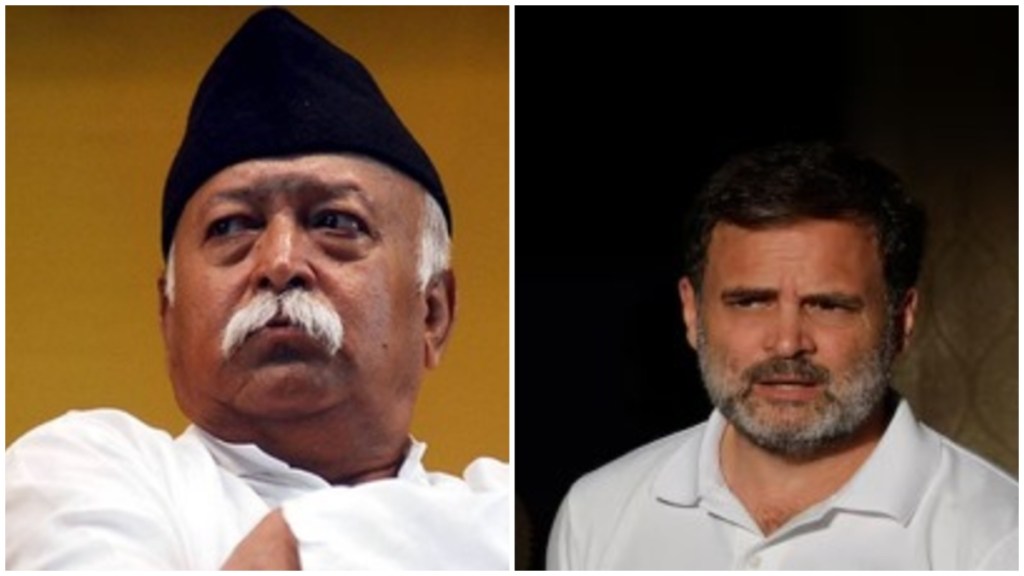Leader of Opposition in the Lok Sabha, Rahul Gandhi, on Wednesday launched a scathing attack on the BJP and the RSS, accusing them of having “captured every single institution” in the country. His remarks were specifically aimed at RSS chief Mohan Bhagwat, who, on Monday, claimed that India never truly achieved Independence in 1947. Bhagwat had controversially stated that true independence came only with the consecration of the Ram Mandir in Ayodhya. Gandhi labelled Bhagwat’s statement as an insult to the entire nation’s freedom struggle and accused him of committing “treason.”
Gandhi’s Strong Rebuttal at Congress HQ Inauguration
Gandhi made these comments during the inauguration of the Congress’s new headquarters in Delhi, emphasising the significance of the timing. He pointed out the symbolism of the building’s opening and Bhagwat’s speech, linking it to the essence of India’s hard-won independence and the sacrifices of millions that led to the creation of the country’s Constitution. “This building is not just made of bricks; it has emerged from the soil of our country, from the hard work and sacrifices of millions of people,” Gandhi stated.
During his address, Gandhi painted a stark contrast between two ideological visions—one represented by the Congress and the other by the RSS and BJP. He argued that the current political climate reflects a fundamental clash between these visions, with the Congress upholding the principles of democracy, inclusivity, and unity, while the RSS promotes a more centralised, divisive ideology. “We are now fighting the BJP, the RSS, and the Indian state itself,” Gandhi said, further highlighting the ideological battle the country is witnessing.
Gandhi Denounces Bhagwat’s Comments as Treason
Gandhi went further to label Bhagwat’s remarks as a direct attack on India’s Constitution and the freedom movement. He emphasised that the Constitution symbolises India’s independence, and Bhagwat’s statement that India’s true independence was realised only with the Ram Mandir contradicted the very essence of the country’s freedom struggle. “To say that India did not get Independence in 1947 is an insult to every single Indian,” Gandhi asserted. He further argued that in any other country, Bhagwat’s comments would have led to arrest and legal consequences.
BJP Responds to Gandhi’s Statements
Following Gandhi’s speech, BJP national president JP Nadda responded sharply, accusing the Congress of harboring “ugly truths.” Nadda posted on the social media platform X (formerly Twitter), stating that Gandhi had exposed the Congress’s true intentions of undermining the integrity of the Indian state. “I ‘compliment’ Mr. Rahul Gandhi for saying clearly what the nation knows – that he is fighting the Indian state,” Nadda wrote, labeling Gandhi’s actions as divisive and detrimental to national unity. Nadda’s response highlighted the growing ideological rift between the Congress and the BJP, with both sides blaming each other for weakening the country.
In his speech, Gandhi also emphasised the symbolic importance of the new Congress headquarters, which represents a vision of an inclusive India. He remarked on the equal treatment of all national languages, cultures, and communities within the building. “There is no superior language, no inferior language, no superior culture, no inferior culture; they are all the same. That is written in the Constitution, and it is symbolised by this building,” Gandhi said, contrasting this vision with the RSS’s vision of a centralised India.
Congress vs. RSS
Gandhi’s comments encapsulated a growing ideological divide within India. While the Congress party stands firm on values of democracy, equality, and the rule of law, the RSS’s increasingly assertive views—especially under the leadership of Mohan Bhagwat—have drawn sharp criticism from political opponents. The remarks over the status of India’s independence, and the role of the Constitution in shaping the nation’s democratic framework, are emblematic of the ongoing ideological battle between the two sides.
As the political discourse heats up in the run-up to upcoming elections, it is clear that these ideological clashes are set to shape the future direction of India’s political landscape.

